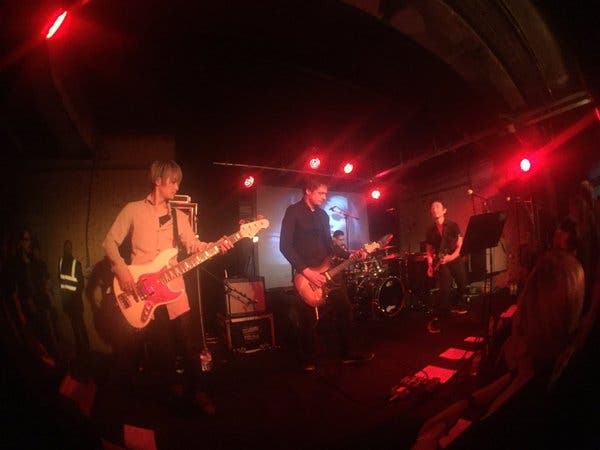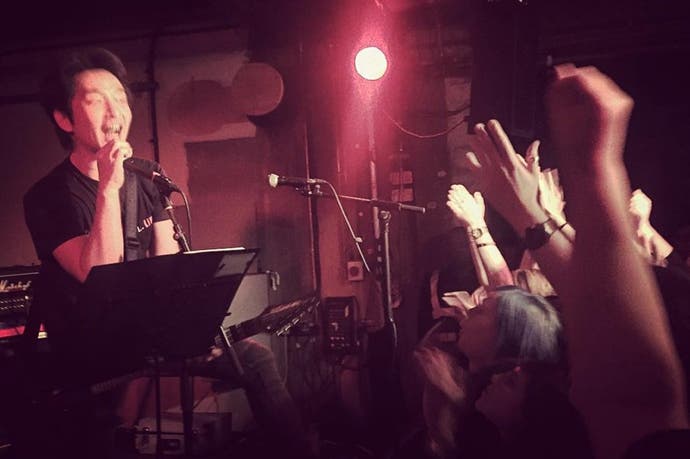Dead and live: Silent Hill's strange afterlife
Yamaoka's concerts showed that the fanbase is alive and kicking, even if the series isn't.
I don't know how we got here. A sense of expectation as thick as fog hangs in the air of this hot, dark room. Not for the first time, I wonder how this is happening. How it is I am here, shoulder to shoulder, with my people, waiting, watching a cyclical stream of digital faces - faces I feel I know better than my own - flickering across the screen.
Concerts built around video game music are nothing new. The Legend of Zelda and Final Fantasy tours have been selling out auditoriums both sides of the Atlantic, and the Video Games Live show - an orchestral retelling of some of gaming's most celebrated scores - is now a decade old. But tonight is different. Whereas those shows are celebrating decades of chiefly classical scores, accompanied by a full orchestra, what we're here for - what I'm here for - is just one person. It's someone you may not even have heard of.
The lights dim as four shadows step onto the stage and the crowd explodes. A drum-kit counts down, and the opening chords of Theme of Laura - a meaty, melancholic piece of music stuffed with sorrow and soul - swells across the room, pushing into every corner. In the middle of that noise is the man behind it all: the 47-year-old composer Akira Yamaoka.
My love of gaming unfurled along the dank streets of Silent Hill, a world in which the mundane turns into the monstrous. I spent hours, days - and collectively years - pouring over theories and interpretations, symbolism and story, collecting statues and strategy guides and decade-old promotional items (oh, that Silent Hill 2 radio still eludes me). Even now, if probed, I don't really know why it is that dark, empty town hooked me so. All I do know is that hook me it did.

I didn't realise that games could be anything other than day-glo platformers. Metal Gear Solid had been my first foray into a mature, sophisticated narrative, but it was the accompanying demo disc, Silent Hill, that first made me shout out, distraught, at the screen. It was the first game to make me cry. Before Silent Hill, I didn't understand the potency of interactive storytelling and for every game that's come since, every story that built you up and dropped you down and lied and cheated and filled your head with unpredictable accounts from an unreliable narrator. It was Silent Hill 2, a game now 15 years old, that laid that first rusty, bleeding blueprint.
I've always been an absolutely terrible horror fan (I still watch horror movies behind tented fingers) but for the very first time I was so captivated by a story, my need to uncover the truth trumped the fear of playing. I could only stick it out for half-hour chunks - the shaking and sweating wouldn't let me play for longer - but play it I did, my footfalls echoing around the school halls, the hospital rooms, the alleyways, the abandoned amusement park, desperately seeking a resolution, bewildered by the story unfolding before me but unable to stop pushing forward, dreading the ending but too terrified of the shuffling figures and rusty pipes and bleeding grates and the slow, steady spin of the fans to stand still.
Entrenched in Silent Hill's damaged DNA lies Yamaoka's music, the composer's sound as iconic now as the nurse's featureless faces and plunging necklines. His soundscapes - raw and industrial, and increasingly melodic as the franchise matured - offer a jarring, unsettling aural backdrop every bit as terrifying as the visuals. Others, like Silent Hill 2's main theme, Theme of Laura, are soaring, desolate tracks of such mesmerising melancholy, I'd sit for half hour and just let the title movie play over and over just to hear it.
And that's what we're waiting to hear tonight - an assortment of the franchise's most memorable music, played live by the man who created it, the man who continued to score - and latterly, produce - the games long after the series left its spiritual home of Japan.
I wonder if Yamaoka knew 15 years ago he'd been touring the UK, bringing game music to a community big enough and hungry enough to sellout three shows, necessitating three additional dates.
I know I'd never thought I'd be here, front row centre, to watch a composer play video game music. Since I've been entrenched in the Silent Hill community, I've come to know its people - creators and fans alike. We're not always a forgiving bunch. The Team Silent vs. Team Anywhere Else debate still fires forum discussion to this day, and for every fan of Downpour, you'll find three who hate it. Each game, though varying in plot and polish, has its friends and detractors. Sometimes the criticism is just; sometimes it is not.
I didn't know about Silent Hills when the P.T. demo was unveiled at Gamescom 2014. When the world watched SoapyWarPig solve that final puzzle and the opening notes of that familiar, haunting theme drifted from the screen, I was as shocked - as delighted - as anyone.
The fandom, again, poured over the symbolism. The story. We sought not only resolutions to those maddening puzzles, but also the explanations sitting behind the exposition. We debated and dissected and delighted in this rebirth.
I had been intrigued when it was just P.T.; knowing it was a teaser to a new Silent Hill instalment - a Silent Hill instalment led by Hideo Kojima, no less - was unbelievable. And then we learned about Guillermo del Toro. And Junji Ito. A source intimated to me that Yamaoka had been lined up to score the game. This floundering franchise was to be resurrected in the most spectacular way.

I genuinely didn't believe Konami would cancel it. When the rumours bubbled up, facts muddied by hearsay and presumption, I sat smug in my assertions. I've been reporting video game news for half a decade; never have I see a game reveal with the traction of Silent Hills. P.T. turned the spotlight onto a franchise that had hitherto been cloaked in shades of shadow and dissatisfaction. There was no way Konami would cancel Silent Hills.
I don't know what went wrong. I suspect we won't ever know, not the true story. Konami still hasn't given up much of its secrets, despite its very regrettable, very public fall-out with golden child Kojima.
But that's not what tonight is about.
Tonight is a celebration, a bringing together of a fandom that has grown and matured, if waxed and waned, for almost 20 years. The crowd is in good cheer and good voice. We know the words. We have been singing these tracks for years.
Yet as the final notes of You're Not Here echo around the room, it's hard to think about not only where the franchise has been, but also where it had been heading. Perhaps tonight, then, is more commemoration than celebration.


